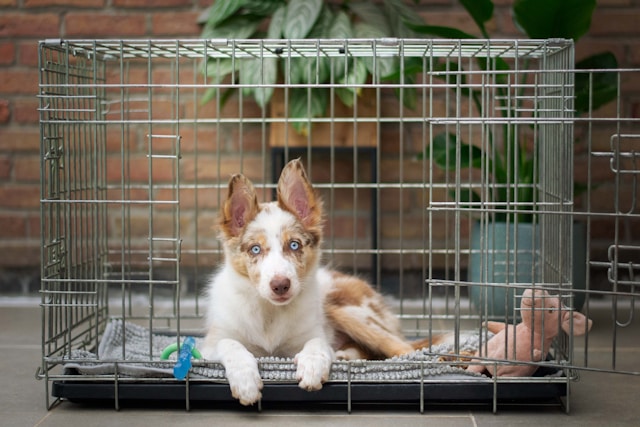5 Disaster Tips for Pet Parents

In the event of extreme weather or a disaster, would you know what to do to protect your pet?
Unfortunately, most pet owners are unsure of what to take if faced with such a situation. The American Pet Products Association (APPA) National Pet Owners Survey reports that many pet owners have thought about disaster response but are still determining what they would do to care for their pets.
The best thing a responsible pet owner can do is be prepared beforehand.
Prepare a "Grab & Go" Pet Disaster Travel Kit
-
Animal advocacy and disaster-response organizations recommend having a disaster travel kit readily available for your pet. Good news: It's easy to pull one together.
Keep a small duffel bag or something as simple as a recycled shopping bag filled with the items listed below in a readily accessible area that you can quickly grab when evacuation is necessary.
Pawdarling Pet Insurance Disaster Travel Kit Checklist:
-
Your pet's regular food
-
Portable feeding bowls
-
Bottled water
-
Collar or harness with ID tags and leash
-
Pet medications. In addition to regular prescriptions, talk to your veterinarian about calming medicines if your pet is anxious.
-
A favorite pet toy
-
Garbage or doggie waste bags, paper towels, small litter box, scoop, and litter. Cleaning supplies can also be helpful if you have room.
-
Current photos of your pets. These are important if you become separated and need to post on "lost pet" services or create flyers.
-
List of important phone numbers. Your veterinarian, local animal shelters, pet-friendly lodgings, friends, relatives, etc.
-
List of current vaccinations and medical conditions
-
Soft fabric muzzle. Some pets become nippy when scared or stressed, and a comfortable fabric muzzle will keep everyone safer.
While not part of the kit, getting your pet a microchip ID is also essential in disaster prep. Collars can be slipped, ID tags can fall off, but a microchip is forever. Register your pet's chip to ensure the best chance at reunion.
Pet Kennels and Bedding
If you have the time to locate your pet's bed or a blanket before evacuating your home, bring them. These items can help reduce your pet's stress and make them comfortable.
A pet carrier and/or portable kennel is even better, especially for cats. A carrier or kennel will help shield your pet from strange noise, curious onlookers, and other wandering pets. It will also prevent your pet from becoming skittish and fleeing, potentially separating you from chaos. Use a permanent marker to put your name and phone number on the carrier.
Be sure to acclimate your pet to the carrier beforehand by putting treats inside or feeding meals there.
Locate an Emergency Shelter That Accepts Pets
Should you have to evacuate to a shelter, it is crucial to remember that not all emergency shelters accept pets. Researching shelters and boarding facilities for your pet now can help you avoid the difficulties of locating a place for your pet to stay during a disaster. Your veterinarian or local municipal animal shelter may point you in the right direction.
Find a Pet-Friendly Hotel
Make inquiries ahead of time. Contact hotels outside your immediate area and ask if they have pet-friendly policies and/or restrictions. You might even ask if "no pet" policies can be waived in an emergency. Make sure to keep a list with phone numbers of pet-friendly places in your pet's grab-and-go travel kit. While there are apps that will locate hotels, veterinarians, and boarding kennels, you may need to reserve power on your cell phone, and cell systems may be inoperable or overloaded in an emergency.
Reach Out to Friends or Family Members
Take your time with disaster approaches; check to see if friends or relatives outside of your disaster zone would be willing to shelter your pet in the case of an emergency. Preparing for an emergency now can benefit your family later; time is of the essence. Consider getting your pet insured as part of being prepared for whatever may happen. Get a quote today from Pawdarling Pet Insurance!
Disaster Tips For Large Animals
Large animal owners must take proactive steps to prepare for disasters. In addition to the aforementioned tips:
-
Ensure all animals have proper identification.
-
Whenever possible, evacuate animals well in advance and pre-plan primary and secondary evacuation routes.
-
Have the necessary vehicles, trailers, experienced handlers, and drivers ready to transport and care for each type of animal.
-
Ensure evacuation destinations have essential provisions such as food, water, veterinary care, and handling equipment.
-
If evacuation becomes impossible, owners should decide to move large animals to a secure shelter like a barn or release them outdoors.
Pet safety is a paramount concern, especially regarding natural disasters. Preparing can make all the difference for your beloved animal companions in crisis. Natural disasters like hurricanes, wildfires, or floods can strike unexpectedly, and pets may be left vulnerable without a plan in place. An emergency kit, including food, water, medications, and comfort items for your pets, can ensure their well-being during evacuation or shelter-in-place. Additionally, proper identification, vaccinations, and a plan for reuniting with your pets if separated are essential components of pet safety. Being prepared is not just a matter of responsibility; it's a way to show our commitment to the well-being and safety of our cherished animal family members.
Get insurance plans with wide-ranging coverage options









